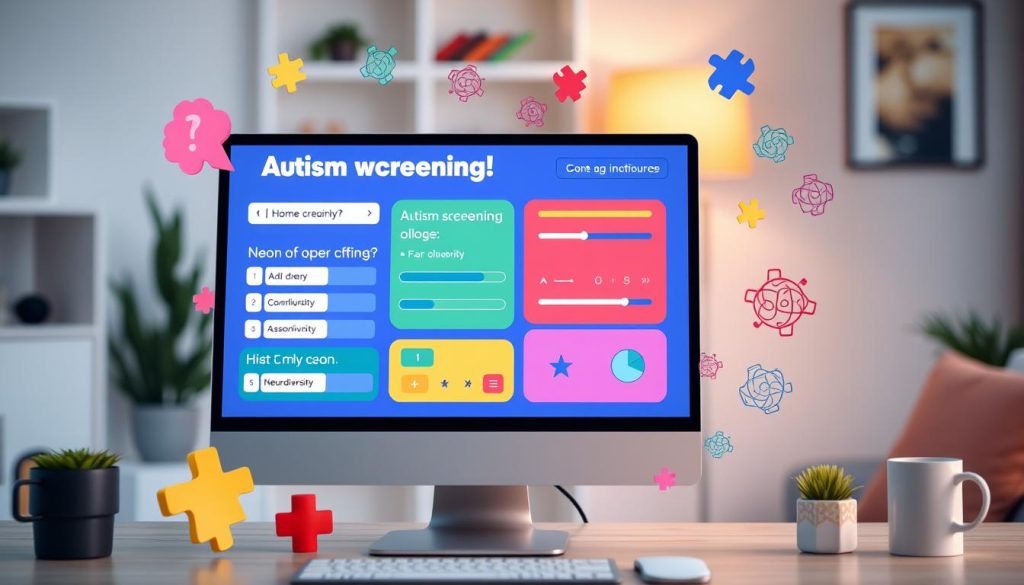Ever felt like you don’t quite fit in? Struggling in social situations or feeling overwhelmed by sights and sounds? You might wonder if these feelings are signs of autism spectrum disorder.
Spotting autism symptoms in adults is not always easy. They can be different from what kids show.
This guide will help you understand the signs of autism spectrum disorder. We’ll cover everything from common traits to how to get diagnosed. If you’re questioning if you might have autism, you’re in the right place to start learning more about yourself.
Understanding Autism Spectrum Disorder: A Comprehensive Overview
Autism Spectrum Disorder (ASD) is a complex condition that affects how people interact and communicate. Each person’s experience with ASD is unique. Let’s dive deep into ASD to understand its nature and impact.
What is Autism Spectrum Disorder (ASD)?
ASD is a neurodevelopmental disorder that makes social interaction, communication, and behavior challenging. Adults with autism might struggle with social cues, have intense interests, and be sensitive to certain sounds or sights.
The Spectrum Nature of Autism
Autism is called a spectrum disorder because it affects people differently. Some need a lot of support, while others live independently. It’s important to understand the signs of autism to help early and support those affected.
Current Understanding and Research
Research on ASD is always evolving, with new findings coming to light. Scientists are studying genetics, environment, and brain development to understand autism better. They’re also looking into early intervention and support for adults with autism.
| Aspect | Children | Adults |
|---|---|---|
| Social Skills | May struggle with playgroups | Difficulty maintaining friendships |
| Communication | Delayed language development | Challenges with small talk |
| Interests | Intense focus on specific toys | Deep knowledge in niche subjects |
Could I Have Autism: Common Questions and Initial Steps
Many adults wonder if they might have autism. Starting with self-evaluation can help you understand your traits and behaviors. If you’re questioning your neurological makeup, you’re not alone.

Adults often discover their autistic traits later in life. This realization comes after learning about autism spectrum disorder (ASD) and seeing similarities in their experiences. If you’re thinking about an autism self-evaluation, here are some steps to start:
- Research autism traits and characteristics
- Reflect on your childhood experiences
- Observe your social interactions and communication style
- Note any sensory sensitivities or specific routines
- Consider taking an online screening test
Remember, self-evaluation is just the start. A professional diagnosis is needed for a clear answer. If you think you might have autism, talk to a healthcare provider who specializes in adult autism diagnoses.
| Common Questions | Initial Steps |
|---|---|
| Am I just socially awkward? | Analyze your social patterns and difficulties |
| Why do I struggle with change? | Examine your routines and reactions to disruptions |
| Is my sensory sensitivity normal? | Document your sensory experiences and triggers |
| Could my special interests be autism-related? | Reflect on the intensity and nature of your interests |
Exploring the possibility of autism can be enlightening. Whether you find out you’re on the spectrum or not, it can lead to greater self-understanding and acceptance.
Early Warning Signs of Autism in Adults
Spotting autism in adults can be tough. Many signs of high functioning autism are missed for years. This part looks at key signs that might point to autism in grown-ups.
Social Communication Challenges
Adults with autism find social talks hard. They might miss social hints, struggle to keep eye contact, or find small chats tough. Some might sound too serious or get jokes wrong.
Behavioral Patterns and Routines
Adults with autism often stick to their routines too much. They might follow schedules very closely, repeat actions, or dive deep into certain subjects. Any change in their routine can upset them a lot.
Sensory Sensitivities
Many adults with autism are very sensitive to their surroundings. They might get too much from loud sounds, bright lights, or certain textures. But, some might also look for intense sensory experiences.
| Area | Common Signs |
|---|---|
| Social Communication | Difficulty with eye contact, misinterpreting social cues, literal interpretation of language |
| Behavioral Patterns | Strict routines, repetitive movements, intense interests in specific topics |
| Sensory Processing | Oversensitivity to sounds or lights, unusual reactions to textures or tastes |
Keep in mind, these signs can differ from person to person. If you see several of these traits often, it might be time to get a professional check-up for a correct diagnosis.
Recognizing Autism Traits in Women
It’s key to understand autism in women as research shows it affects them differently. Autism spectrum disorder (ASD) often shows up in unique ways in females. This can lead to them being underdiagnosed and not getting the support they need.

Gender Differences in Autism Presentation
Autism in women can be harder to spot. While men might show clear signs, women often have quieter behaviors. This can cause many to go undiagnosed, with almost 80% of autistic females not being diagnosed by age.
Masking and Camouflaging Behaviors
Many women with autism learn to hide their traits to fit in. They might mimic others, hide their stimming, or force eye contact. While these strategies help in social situations, they can cause stress and anxiety over time.
Female-Specific Autism Characteristics
Autism traits in women include:
- Intense interests in people, not objects
- Difficulty keeping friendships, despite wanting to connect
- Sensory sensitivities that may be internalized
- Passionate focus on specific topics or hobbies
- Struggles with unwritten social rules
It’s vital to recognize these unique traits in women with autism. By understanding these differences, we can better diagnose and support them. This helps improve their life quality and self-understanding.
High-Functioning Autism: Signs and Characteristics
High-functioning autism is for people on the autism spectrum with average or above-average smarts. They show unique signs that differ from others with autism spectrum disorder (ASD).
Adults with high-functioning autism often shine in certain areas. They focus deeply and know a lot about their interests. Yet, they might find social interactions and talking hard.
Some common traits in adults with high-functioning autism include:
- Difficulty interpreting social cues
- Challenges in maintaining eye contact
- Preference for routine and structure
- Intense focus on particular topics
- Sensory sensitivities
Knowing these traits helps spot signs of high-functioning autism in oneself or others. Remember, autism affects everyone differently. Getting a professional diagnosis is key to knowing for sure.
| Area | Typical Traits | Impact on Daily Life |
|---|---|---|
| Social Interaction | Difficulty reading social cues, maintaining conversations | Challenges in forming relationships, workplace interactions |
| Communication | Literal interpretation, struggle with sarcasm or idioms | Misunderstandings in social and professional settings |
| Interests | Intense focus on specific topics | Deep expertise in certain areas, career benefits |
| Sensory Processing | Heightened sensitivity to lights, sounds, textures | Need for sensory-friendly environments, risk of overstimulation |
Spotting these signs can help understand and support those on the spectrum. If you see these traits in yourself, getting professional help is a good step.
Social Communication Patterns in Adults with Autism
Adults with autism have unique ways of communicating. These patterns are important signs of autism that can affect how they interact with others. It’s key to understand these patterns to help them connect better with others.
Verbal Communication Challenges
Many adults with autism find talking hard. They might have trouble:
- Starting or keeping conversations going
- Getting sarcasm or figurative language
- Talking in a flat voice
- Talking about things they’re not interested in
These issues can cause misunderstandings and make them feel left out.
Non-verbal Communication Issues
Non-verbal cues are also a challenge for adults with autism. Common signs include:
- Not making eye contact
- Having trouble reading facial expressions
- Using odd body language or gestures
- Not knowing how close is too close

Social Relationship Dynamics
Adults with autism may have different social relationships. They might:
- Like being alone more
- Find it hard to make or keep friends
- Not get social norms
- Feel too stressed in big groups
These patterns can affect their personal and work relationships.
| Communication Area | Typical Challenges | Potential Strategies |
|---|---|---|
| Verbal | Difficulty with small talk | Practice conversation starters |
| Non-verbal | Limited eye contact | Use relaxation techniques |
| Social Relationships | Trouble making friends | Join autism support groups |
Sensory Processing and Autism
Sensory processing differences are common in adults with autism and are key signs of the disorder. Many people with autism see the world differently through their senses. This can greatly affect their daily lives.
Those with autism might be too sensitive or not sensitive enough to sensory input. Being hypersensitive means they’re very sensitive to stimuli. Loud noises, bright lights, or certain textures can be too much. Being hyposensitive means they’re not as responsive to sensory information. They might look for intense sensations or have trouble noticing important sensory cues.
- Sound perception
- Visual processing
- Touch sensitivity
- Taste and smell reactions
- Body awareness
It’s key to understand these sensory challenges to recognize autism traits in adults. It’s important to remember that sensory experiences vary a lot among individuals on the spectrum.
| Sense | Hypersensitivity Example | Hyposensitivity Example |
|---|---|---|
| Hearing | Distress from vacuum cleaner noise | Not responding to name being called |
| Sight | Discomfort with fluorescent lights | Fascination with spinning objects |
| Touch | Aversion to certain clothing textures | High pain tolerance |
Recognizing these sensory differences can help support and understand individuals with autism better. It’s a key part of identifying autism spectrum disorder signs and providing the right accommodations.
Executive Functioning and Daily Life Challenges
Adults with autism often face unique challenges in daily life. These challenges come from differences in executive functioning. This can affect organization, time management, and decision-making skills.
Organization and Planning Difficulties
Many adults with autism struggle to organize tasks and plan ahead. They might find it hard to break down big projects into smaller steps. Keeping their living spaces tidy can also be a challenge.
This can lead to feeling overwhelmed and stressed. They might feel this way when faced with complex responsibilities at work or home.
Time Management Struggles
Managing time effectively is another common challenge. Adults with autism may lose track of time easily. They might have trouble estimating how long tasks will take.
This can result in being late for appointments or rushing to meet deadlines. It can cause anxiety and frustration.
Decision-Making Patterns
Making decisions can be difficult for adults with autism. They might spend a long time weighing options. Feeling paralyzed when faced with choices is common.
This indecisiveness can affect both small daily decisions and major life choices. It can impact personal and professional growth.
Understanding these executive functioning challenges is key. It helps recognize autism symptoms in adults. By identifying these traits, individuals can seek support and develop strategies for managing daily life.
The Autism Diagnosis Process for Adults
Getting an autism diagnosis as an adult is a complex journey. It often starts with recognizing signs that make you seek help. Many adults get tested after feeling different or struggling in life for years.
An adult autism assessment involves a team of experts. This team includes psychologists, psychiatrists, and speech-language pathologists. They evaluate your behavior, communication, and developmental history together.
The diagnostic process includes several steps:
- In-depth interviews about your childhood and current experiences
- Observations of your social interactions and communication skills
- Cognitive assessments to evaluate your thinking and problem-solving abilities
- Sensory processing evaluations
Professionals use the DSM-5 criteria during the test. They look for persistent social communication and interaction issues. They also check for restricted or repetitive behaviors or interests.
Adult autism assessment can take several sessions. Be ready to share detailed information about your life. Remember, there’s no single test that can definitively diagnose autism in adults. The goal is to understand your unique traits and challenges.
Self-Assessment Tools and Screening Options
Looking into autism in adulthood is a journey of self-discovery. Many wonder about their neurodevelopmental profile and seek insights. This section talks about self-assessment tools and screening options for those curious about autism traits.
Online Screening Tools
The internet has many resources for autism self-evaluation. Reputable organizations offer online quizzes to help understand traits. These quizzes ask about social interactions, communication, and sensory experiences.

Professional Assessment Methods
Online tools are good for a start, but professional assessments are more detailed. Clinicians use tests, interviews, and observations for a thorough evaluation. They might use:
- Autism Diagnostic Observation Schedule (ADOS)
- Autism Diagnostic Interview-Revised (ADI-R)
- Ritvo Autism Asperger Diagnostic Scale-Revised (RAADS-R)
When to Seek Professional Help
If an online quiz suggests further evaluation or if daily life is challenging, seek professional help. Signs that need professional attention include:
| Area of Concern | Examples |
|---|---|
| Social Difficulties | Trouble maintaining friendships, misunderstanding social cues |
| Communication Challenges | Difficulty with small talk, interpreting non-verbal communication |
| Sensory Sensitivities | Overwhelming reactions to lights, sounds, or textures |
| Executive Functioning Issues | Struggles with organization, time management, or decision-making |
Remember, online tools are just the beginning. A professional diagnosis can bring clarity and access to support and resources.
Living with Undiagnosed Autism: Common Experiences
Many adults wonder, “Could I have autism?” This question often comes from feeling different or struggling with social interactions. Living without knowing you have autism can shape your life in unique ways.
People with undiagnosed autism may face daily challenges without knowing why. They might find it hard to keep friends or have romantic relationships. Work can also be stressful, as they might misread social cues or get overwhelmed by sounds and sights.
Discovering you have autism traits can be a turning point. Many feel relieved when they get diagnosed, understanding why they’ve always felt different. This newfound understanding can help them cope better and feel more confident.
Common experiences of adults with undiagnosed autism include:
- Difficulty reading social cues and body language
- Intense focus on specific interests or hobbies
- Sensory sensitivities to light, sound, or touch
- Struggles with changes in routine or unexpected events
- Feeling exhausted after social interactions
If these experiences sound familiar, it might be time to explore autism. Remember, autism is a difference, not a weakness. Understanding your neurodiversity can lead to self-acceptance and support.
Support Systems and Resources for Adults with Autism
Finding support as an adult with autism can change your life. Many resources help with daily challenges and personal growth. Support groups let you connect with others who understand you, giving valuable insights and emotional support.
Therapy options for adults with autism are very helpful. Cognitive Behavioral Therapy (CBT) and occupational therapy are popular. They help with social skills, sensory processing, and executive functioning.

Online communities are a big help for many adults with autism, including women who were diagnosed later. These platforms are a safe place to talk about experiences, share strategies, and find validation.
Here’s a breakdown of common support systems and resources:
| Resource Type | Benefits | Examples |
|---|---|---|
| Support Groups | Peer connection, shared experiences | AANE, GRASP |
| Therapy | Skill development, emotional support | CBT, Occupational Therapy |
| Online Communities | 24/7 access, diverse perspectives | Reddit r/autism, WrongPlanet |
| Vocational Services | Job training, workplace accommodations | Vocational Rehabilitation Centers |
Remember, getting an adult autism assessment is key to using these resources. For women with autism, there are now more support groups and resources. These can greatly improve your life and help you feel part of a community.
Building a Path Forward: Next Steps After Recognition
Discovering you might have autism traits is a big moment. If you’ve thought “could I have autism,” it’s time to act. Starting with an autism self-evaluation is good, but getting a professional diagnosis is key.
- Seek a professional evaluation from a specialist in adult autism
- Join support groups to connect with others on similar journeys
- Explore coping strategies for challenges you’ve identified
- Learn about neurodiversity and embrace your unique strengths
Remember, moving forward after an autism diagnosis means understanding yourself better and finding support. It’s not about changing who you are. It’s about finding ways to thrive as your true self.
| Area of Focus | Action Steps |
|---|---|
| Professional Help | Schedule an assessment with an autism specialist |
| Self-Education | Read books and articles about adult autism |
| Community | Join local or online autism support groups |
| Self-Care | Develop a routine that accommodates sensory needs |
By taking these steps, you’re not just wondering “could I have autism.” You’re actively learning about yourself. This journey can lead to better self-awareness and a more rewarding life.
Professional Help and Treatment Options
Getting professional help is key for adults who think they might have autism. An adult autism assessment can clear things up and lead to different treatments. These assessments involve detailed checks by experts who know how to spot autism in adults.
After a diagnosis, you can get a treatment plan made just for you. This might include:
- Cognitive Behavioral Therapy (CBT)
- Social skills training
- Occupational therapy
- Speech and language therapy
Therapists mix these methods to tackle specific issues adults with autism face. For example, CBT can help with anxiety and improve social skills. Occupational therapy helps with everyday tasks.
Some adults might need medicine for conditions like anxiety or depression. It’s vital to work with a doctor to find the best treatment.
| Treatment Option | Benefits | Considerations |
|---|---|---|
| Cognitive Behavioral Therapy | Improves social skills, reduces anxiety | Requires consistent practice |
| Occupational Therapy | Enhances daily living skills | May need long-term commitment |
| Medication | Manages co-occurring conditions | Potential side effects |
Every person’s autism journey is different. What works for one might not work for another. It’s important to keep checking in and adjusting treatment plans for the best results.
Embracing Neurodiversity: Autism as a Difference, Not a Disorder
Our view of autism spectrum disorder signs is evolving. Now, many see it as a unique way of thinking and experiencing the world. This change is part of the neurodiversity movement, which celebrates the natural variations in human brains.
Adults with autism traits often have remarkable strengths. They might have exceptional focus, attention to detail, and creative problem-solving skills. These qualities can help them excel in fields like technology, arts, and sciences.
Self-acceptance is key for adults with autism. Understanding and appreciating your unique traits can boost self-esteem and well-being. It’s also important for society to recognize and value neurodiverse individuals’ contributions. This acceptance makes our world more inclusive, where everyone’s abilities are respected and used.
As we learn more about autism spectrum disorder signs in adults, it’s clear that neurodiversity enriches our communities. Embracing differences instead of trying to fit into one standard opens doors to innovation, creativity, and a deeper understanding of the human experience.
FAQ
Q: What are the common signs of autism in adults?
A: Adults with autism often struggle with talking to others and following routines. They might be very sensitive to sounds or lights. They also find it hard to understand nonverbal cues and adapt to new situations.
Q: Can autism be diagnosed in adulthood?
A: Yes, autism can be diagnosed in adults. Many people, including those with high-functioning autism, get diagnosed later in life. A diagnosis involves a detailed evaluation by experts in autism.
Q: How does autism present differently in women?
A: Women with autism might be better at hiding their symptoms. They often have stronger language skills and different interests. They may also feel more anxious in social situations and have trouble keeping friends.
Q: What is the process for getting an autism diagnosis as an adult?
A: Getting an autism diagnosis as an adult means a thorough check-up by a mental health expert. This includes interviews, tests, and questions about your past and current behaviors.
Q: Are there online tools for autism self-assessment?
A: Yes, there are online tools like the Autism Spectrum Quotient (AQ) and the Ritvo Autism Asperger Diagnostic Scale-Revised (RAADS-R). But remember, these are not official diagnoses. If you’re concerned, see a professional.
Q: What are some common sensory issues in adults with autism?
A: Adults with autism might be very sensitive to sounds, lights, textures, or smells. They could feel overwhelmed in loud places or have trouble with certain fabrics. They might also be very sensitive to specific sounds or sights.
Q: How can I support a friend or family member who might have autism?
A: To support someone with autism, be patient and understanding. Learn about autism, respect their needs, and communicate clearly. If they’re open to it, encourage them to get professional help. Always offer emotional support.
Q: What is neurodiversity and how does it relate to autism?
A: Neurodiversity is the idea that differences in brain function, like autism, are just variations. It’s about accepting and accommodating these differences, not trying to change them.
Q: Can adults with autism live independently?
A: Yes, many adults with autism live on their own, even those with high-functioning autism. How independent they are depends on their challenges and strengths. Some need little help, while others need more support with daily tasks.
Q: Are there specific therapies or treatments for adults with autism?
A: Adults with autism can try different therapies like cognitive behavioral therapy (CBT), social skills training, and occupational therapy. The best treatment varies based on the individual’s needs and challenges.


















